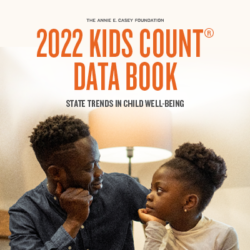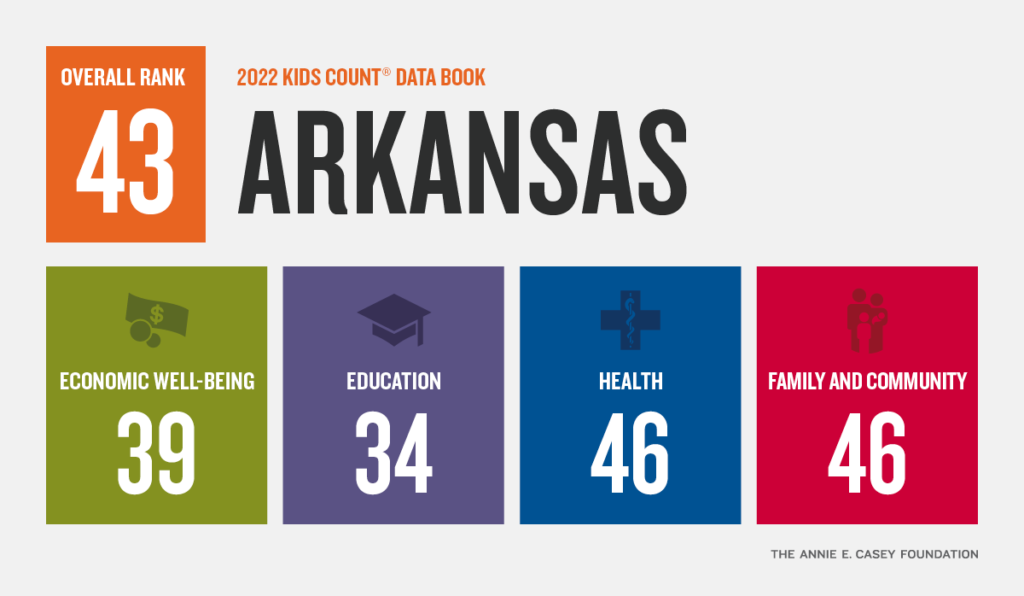
Data Show Alarming Increase in Low Birth Weight Babies and Child and Teen Deaths in Arkansas
Arkansas ranks 43rd in child well-being, according to the 2022 KIDS COUNT® Data Book, a 50-state report of recent household data developed by the Annie E. Casey Foundation analyzing how children and families are faring.
The report sheds light on the health, economic and other challenges affecting American children as well as how those challenges are more likely to affect Black, Native American, Asian and Pacific Islander, and Latino children.
Every child needs food, health care, safe and stable housing, and access to education. But this year’s Data Book shows Arkansas is a harder place to be a child than almost anywhere else in the country. Arkansas’s child well-being outcomes are worse than the national average in 11 out of 16 indicators. And while Arkansas’s outcomes have generally improved over time, we are losing ground in preschool enrollment; our low birth weight babies rate has worsened far faster than the national rate; and we’re seeing a concerning increase in child and teen deaths and teen obesity rates.

There are state-level policy solutions to every troubling piece of data. Lack of political will and lack of targeted investments in our children keeps Arkansas near the bottom of the states. While Arkansas’s lawmakers this week begin debating giving generous tax cuts to the wealthiest Arkansans, we’ve got more children living in poverty, more students lacking proficiency in reading and math, and more teens giving birth than in most other states.
Additionally, children in America, including in Arkansas, are in the midst of a mental health crisis, struggling with anxiety and depression at unprecedented levels. This year’s Data Book focuses on youth mental health, concurring with a recent assessment by U.S. Surgeon General Dr. Vivek H. Murthy that conditions amount to a “youth mental health pandemic.”
The Data Book reports that children across America, and in more than 40 states and the District of Columbia, were more likely to encounter anxiety or depression during the first year of the COVID-19 crisis than previously.
- The national figure jumped 26%, from 9.4% of children ages 3-17 (5.8 million kids) to 11.8% (7.3 million) between 2016 and 2020
- This increase represents 1.5 million more children who are struggling to make it through the day
- Arkansas’s data are especially bleak, with 14.4% of children with anxiety or depression, a 67.4% increase
- This is the third-highest increase of all states
Racial and ethnic disparities contribute to disproportionately troubling mental health and wellness conditions among children of color. Nine percent of high schoolers overall but 12% of Black students, 13% of students of two or more races and 26% of American Indian or Native Alaskan high schoolers attempted suicide in the year previous to the most recent federal survey. Further, many LGBTQ young people are encountering challenges as they seek mental health support. Among heterosexual high school students of all races and ethnicities, 6% attempted suicide; the share was 23% for gay, lesbian or bisexual students.
Each year, the Data Book presents national and state data from 16 indicators in four domains — economic well-being, education, health, and family and community factors — and ranks the states according to how children are faring overall. The data in this year’s report are a mix of pre-pandemic and more recent figures and are the latest available.
“American policymakers must prioritize solutions that don’t leave anyone behind,” said Lisa Hamilton, president and CEO of the Annie E. Casey Foundation. “Children deserve to thrive regardless of their background or in which state they live.”
To address Arkansas’s worsening outcomes for children in our state, AACF makes the following policy recommendations to Arkansas lawmakers:
- Extend postpartum coverage for new mothers in Medicaid. Right now, women insured under pregnancy Medicaid lose their coverage 60 days after delivery. We should expand that to 12 months, as 34 states and the District of Columbia have done or are in the process of implementing.
- Provide presumptive Medicaid eligibility for pregnant women, allowing them to be approved for Medicaid coverage quickly based on their income level.
- Allow children and babies in the lowest-income families to keep their ARKids First health insurance for a full year of continuous coverage, rather than kicking them off their insurance when their family incomes fluctuate month-to-month.
- Change the state-level policies that unnecessarily make it more difficult for Arkansas families to obtain SNAP benefits and to get enrolled in the WIC program – the nutrition program for Women, Infants and Children.
- Require scientifically based sex education in schools, and make it easier for Arkansans, including teens, to obtain long-acting contraception.
- Overhaul harsh policies in the state’s cash assistance program, which is called Temporary Assistance for Needy Families, or TANF. We need to 1) eliminate the family cap now that parents have fewer family planning options and 2) increase the monthly benefit level, which is $203 for a family of three.
The Casey Foundation calls for lawmakers to heed the surgeon general’s warning and respond by developing programs and policies to ease mental health burdens on children and their families. They urge policymakers to:
- Prioritize meeting kids’ basic needs. Youth who grow up in poverty are two to three times more likely to develop mental health conditions than their peers. Children need a solid foundation of nutritious food, stable housing and safe neighborhoods — and their families need financial stability — to foster positive mental health and wellness.
- Ensure every child has access to the mental health care they need, when and where they need it. Schools should increase the presence of social workers, psychologists and other mental health professionals on staff and strive to meet the 250-to-1 ratio of students to counselors recommended by the American School Counselor Association, and they can work with local health care providers and local and state governments to make additional federal resources available and coordinate treatment.
- Bolster mental health care that takes into account young people’s experiences and identities. It should be trauma-informed — designed to promote a child’s healing and emotional security — and culturally relevant to the child’s life. It should be informed by the latest evidence and research and should be geared toward early intervention, which can be especially important in the absence of a formal diagnosis of mental illness.
Stay tuned for a series of blog posts exploring Arkansas’s most recent data and rankings.
